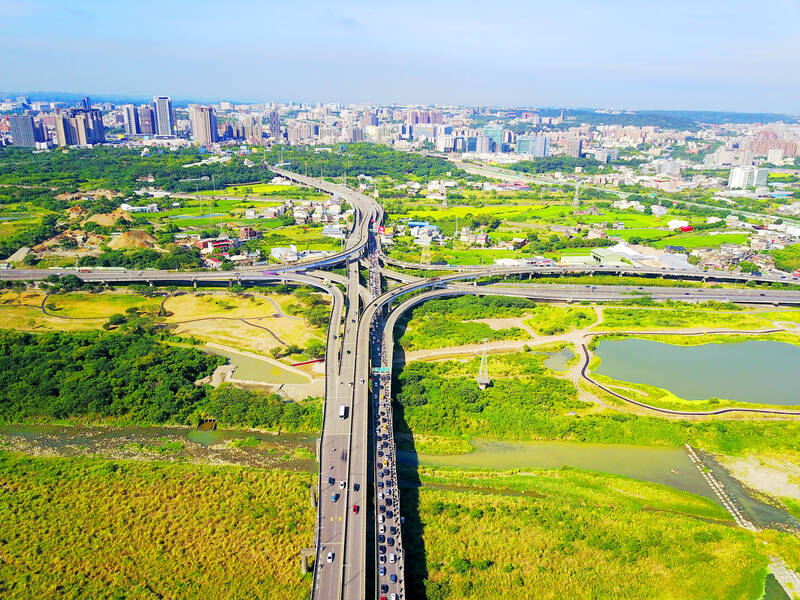Jhubei City in Hsinchu County recorded the nation’s highest growth in absolute population over the past five years, while the highest rate of growth by percentage occurred in Lienchiang County’s Beigan Township (北竿), according to statistics released last week by the Ministry of the Interior.
Jhubei, near the Hsinchu Science Park, saw its population expand by 19,085 people from 2018 through the third quarter of last year. New Taipei City’s Linkou (林口) and Tamsui (淡水) districts were in second and third place, the data showed.
The statistics cover 20 localities that had the largest population increases, including county-administered cities, districts and townships.

Photo courtesy of the Hsinchu County Government
The populations of New Taipei City’s Linkou and Tamsui districts increased by 17,160 and 15,901 respectively. Taichung’s Beitun District (北屯) registered 14,565 new residents.
Several districts in Taoyuan were next-highest in their increases. Taoyuan (桃園) and Jhongli (中壢) districts saw their populations increase by 12,234 and 10,449 respectively, while Gueishan (龜山) went up by 8,651 people, and Bade (八德) 7,882.
Rounding out the top 10 are New Taipei City’s Sijhih District (汐止) with 7,347 new residents, and Kaohsiung’s Renwu District (仁武) with 7,106.
From the remainder of the localities, all but one — Hsinchu County’s Hukou Township (湖口), north of Jhubei — are in Taiwan’s six special municipalities, where nearly 70 percent of Taiwan’s population resides.
City officials in New Taipei City and Taoyuan cited lower housing prices, good public transportation, and access to jobs and recreation as factors driving population growth, particularly among younger people.
Jhubei Mayor Cheng Chao-fang (鄭朝方) said that Hsinchu city and county form a common metropolitan area, whose several science and technology parks have attracted major companies offering large numbers of well-paying jobs.
The ministry also published statistics on the rate of population growth, showing that Lienchiang’s Beigan Township, with a population of about 3,000, grew the most in terms of percentage per quarter.
Beigan Township recorded an average population increase of 1.53 percent per quarter over the five-year period.
Rounding out the top five were Linkou at 0.85 percent per quarter, Taoyuan’s Fusing District (復興) at 0.63 percent, Hualien’s Fengbin Township (豐濱) with 0.6 percent and Jhubei with 0.58 percent.
Locations with the largest rate of population decline were all in Taipei. The capital city’s Xinyi (信義), Songshan (松山), Zhongshan (中山), Daan (大安) and Wanhua (萬華) districts all registered decreases of more than 0.5 percent per quarter during the five-year period, the data showed.
Taipei’s population loss was one of the main topics of debate in November’s Taipei mayoral election, with candidates discussing high housing prices and low wages as factors driving young families away from the capital.
Former Taipei deputy mayor Vivian Huang (黃珊珊) said that Taipei’s population decline should be understood in the context of a nationwide population decline since 2020.
All of Taiwan’s six special municipalities, except for Taoyuan, have registered population declines, and many Taipei residents have chosen to move to New Taipei City or Taoyuan because of their convenient transportation links to Taipei, Huang said during the recent election campaign.
Hualien Civil Affairs Department Deputy Director Lee Wei (李葳) downplayed Fengbin Township’s population growth rate, saying that the rural township has only 4,300 residents and the increase is “no big deal.”
“The denominator is low, so if a few people move in, the growth rate is very large,” Lee said.

Taiwan is stepping up plans to create self-sufficient supply chains for combat drones and increase foreign orders from the US to counter China’s numerical superiority, a defense official said on Saturday. Commenting on condition of anonymity, the official said the nation’s armed forces are in agreement with US Admiral Samuel Paparo’s assessment that Taiwan’s military must be prepared to turn the nation’s waters into a “hellscape” for the Chinese People’s Liberation Army (PLA). Paparo, the commander of the US Indo-Pacific Command, reiterated the concept during a Congressional hearing in Washington on Wednesday. He first coined the term in a security conference last

Prosecutors today declined to say who was questioned regarding alleged forgery on petitions to recall Democratic Progressive Party (DPP) legislators, after Chinese-language media earlier reported that members of the Chinese Nationalist Party (KMT) Youth League were brought in for questioning. The Ministry of Justice Investigation Bureau confirmed that two people had been questioned, but did not disclose any further information about the ongoing investigation. KMT Youth League members Lee Hsiao-liang (李孝亮) and Liu Szu-yin (劉思吟) — who are leading the effort to recall DPP caucus chief executive Rosalia Wu (吳思瑤) and Legislator Wu Pei-yi (吳沛憶) — both posted on Facebook saying: “I

The Ministry of Economic Affairs has fined Taobao NT$1.2 million (US$36,912) for advertisements that exceed its approved business scope, requiring the Chinese e-commerce platform to make corrections in the first half of this year or its license may be revoked. Lawmakers have called for stricter enforcement of Chinese e-commerce platforms and measures to prevent China from laundering its goods through Taiwan in response to US President Donald Trump’s heavy tariffs on China. The Legislative Yuan’s Finance Committee met today to discuss policies to prevent China from dumping goods in Taiwan, inviting government agencies to report. Democratic Progressive Party Legislator Kuo Kuo-wen (郭國文) said

The Ministry of Economic Affairs has fined Taobao NT$1.2 million (US$36,900) for advertisements that exceeded its approved business scope and ordered the Chinese e-commerce platform to make corrections in the first half of this year or its license would be revoked. Lawmakers have called for stricter supervision of Chinese e-commerce platforms and more stringent measures to prevent China from laundering its goods through Taiwan as US President Donald Trump’s administration cracks down on origin laundering. The legislature’s Finance Committee yesterday met to discuss policies to prevent China from dumping goods in Taiwan, inviting government agencies to report on the matter. Democratic Progressive Party